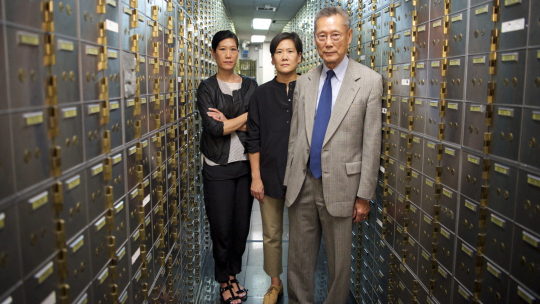I never thought I’d cheer for one of the banks responsible for the 2007-2009 subprime mortgage crisis, but Steve James’ new documentary Abacus: Small Enough to Jail proved me wrong. The film tells the story of Abacus Federal Savings Bank, a family-owned community bank in New York City’s Chinatown. Inspired by the character George Bailey in Frank Capra’s It’s a Wonderful Life (1946), first-generation Chinese immigrant Thomas Sung founded Abacus in 1984 with the intention of aiding other Chinese immigrants navigate America’s financial system. However, the bank gained notoriety for being the only financial institution indicted on criminal charges for the aforementioned mortgage crisis. They were accused of falsifying loan applications so financially unqualified individuals could afford mortgages. Many of these fraudulent mortgages were then sold to Fannie Mae between 2005 and 2010.
But here’s the catch: the bank’s multiple counts of fraud were carried out by lower level employees without the knowledge of their bosses. In addition, Thomas and his daughter Jill—the bank’s President and CEO—immediately fired the responsible employees upon discovery of their crimes. They then promptly notified federal regulators, filed reports with the local police, and cooperated with investigators. If anything, Abacus acted precisely how banks should act in such situations. But in the wake of the mortgage crisis, blood-thirsty investigators made Abacus a scapegoat. The police publicly humiliated the Sung family and their employees, locking them in chains like dangerous convicts and parading them in front of reporters. But instead of taking the District Attorney’s plea deal, Abacus decided to fight the charges in court. It turns out having a daughter who spent several years working in said DA’s office has its benefits.
The Abacus case finds itself at the center of a curious nexus of public outrage and institutional racism. Investigators wanted somebody to pay for the mortgage crisis. Whereas the fear was that the big banks directly responsible for the crisis were “too big to fail,” in Abacus they found a bank small enough to prosecute without risk of ruining the economy. And, as various interviewees point out, the Chinese immigrant community doesn’t have the same political clout as other New York City minorities like the LGBTQ+ and African-American communities. But where the documentary truly shines is in its exploration of the differences between Western and Chinese approaches to financial loans. In the West, finances and mortgages are designed to leave a sizable paper trail. But in China most financial interactions between individuals and local businesses are done indirectly. As one interviewee puts it, if the noodle shop down the street applies for a loan to renovate, the bank doesn’t need paperwork to approve them—they eat there every day and see first-hand how much business they get! Complicating things is how the Chinese make almost no distinction between the concepts of “gifts” and “loans” between close friends and family members. If a mother gives her daughter a gift of $50,000, an understanding exists between the two that the daughter will pay the mother back by taking care of her in her old age. See how that can confuse and complicate Western financial records?
When compared to the rest of his oeuvre, including such classics as the colossal Hoop Dreams (1994), Abacus: Small Enough to Jail will go down as one of James’ more minor works. It’s an important story, but he doesn’t bring a real sense of the objectivity one would expect of a documentarian of his caliber. He seems too quick to side with the Sung Family, too enthusiastic in accepting the idea that they were completely innocent of wrongdoing. Many times the film veers towards becoming a warm-hearted portrait of the Sung’s. But overall, it still satisfies. How many other films, documentary or otherwise, has ever made the finer points of federal financial regulation so interesting?
7/10
ABACUS plays at the New York Film FestivalOctober 6 and 7. For more information on the film and the stand by tickets (the shows are sold out) go here.

No comments:
Post a Comment